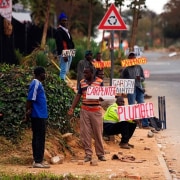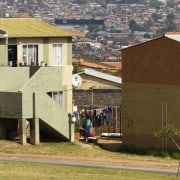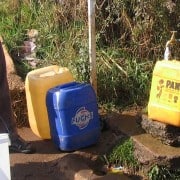|
Getting your Trinity Audio player ready...
|
By Thato Mahlangu
Billions will be made available to help South Africa get back on its feet, said President Cyril Ramaphosa in an address to the nation on 21 April 2020.
Ramaphosa said that additional funding of R20-billion will be allocated to municipalities for the provision of emergency water supply and increased sanitisation of public transport and facilities, adding that the money will also be used for the provision of food and shelter for the homeless during the national lockdown.
“Details will be announced in the adjustment budget tabled by the minister of finance,” Ramaphosa said. The adjusted budget will be delivered on Friday by the minister.
The government will also help struggling communities with funding which will be used to help alleviate social distress and hunger.
Assisting the dwindling economy
Ramaphosa said the government will deploy measures that will protect the wages of workers in the formal sector, and will also be used to assist small, medium, and micro-sized businesses (SMMEs), including the informal sector.
“We continue to provide assistance – in the form of loans, grants and debt restructuring – to SMMEs, spaza shop owners and other informal businesses.”
These entrepreneurs will receive an additional R2-billion, bringing the total value of this assistance to date to over R100-million, said the president.
Some funds will also be made available to assist unemployed people. The Department of Labour will announce details as to eligibility.
Poverty is on the rise
Ramaphosa said the country has experienced “dramatically deepened” levels of poverty and food insecurity in the course of just a few weeks.
“To reach the most vulnerable families in the country, we have decided on a temporary six-month coronavirus grant,” he said. About R50-billion will be allocated to relieving the plight of those who are most desperately affected by the coronavirus.
An increase in social support grants
For the next six months, there will be an increase in the child support grant, older persons grant, disability grant, foster child grant, war veteran’s grant, care dependency grant and the grant-in-aid.
“Social grant beneficiaries will receive an extra R300 in May and from June to October they will receive an additional R500 each month. All other grant beneficiaries will receive an extra R250 per month for the next six months.”
Ramaphosa said the government has established a special Covid-19 Social Relief of Distress grant, which will give people R350 a month for the next six months.
“It will be paid to individuals who are currently unemployed and do not receive any other form of social grant or Unemployment Insurance Fund (UIF) payment. The Department of Social Development will issue the requirements needed to access and apply for this funding.”
Food parcel distribution
Through the South African Social Security Agency, the department will be implementing a technology-based solution to roll out food relief measures at scale.
These measures will include cash transfers and issuing out of vouchers to beneficiaries.
“In addition, to fill the immediate need, the Department of Social Development has partnered with the Solidarity Fund, NGOs and community-based organisations to distribute 250 000 food parcels across the country over the next two weeks,” Ramaphosa said.
Job creation
The president said the creation of jobs will be one of government’s interventions. The Covid-19 pandemic is expected to lead to many job losses, and an additional R100-billion will be set aside for the protection of jobs and to create jobs, said Ramaphosa.
A special UIF has been set up to assist with paying workers’ wages through these difficult times.
“Since the declaration of a state of national disaster over a month ago, the government has put in place a range of measures to support workers’ wages and assist companies in distress. By the end of today, the UIF’s special Covid-19 benefit has paid out R1.6-billion, assisting over 37,000 companies and 60 000 workers.”
Ramaphosa said R40-billion has been set aside for income support payments for workers whose employers are not able to pay their wages.








